Home » Jazz Articles » Interview » Budapest Music Center: A cultural confluence at the hear...
Budapest Music Center: A cultural confluence at the heart of Hungary

The most important thing for us at BMC records is that the music be authentic. Music that is real and makes you believe the artist’s intentions are pure.
—György Wallner, responsible for international relations at the BMC
At the Beginning...
BMC was merely a way for László Göz to release recording projects on his own terms and, first and foremost, was supposed to serve as a general music information center. In the 90s,' Göz already had a reputation as an established voice in the Hungarian jazz scene and was an in-demand trombonist. Besides jazz, classical and contemporary music had and continue to play an important part in his musical persona. His partaking in the Hungarian group 180, which had a legendary status in the country during the 80s,' was only one way in which he indulged his classical and contemporary musical leanings. The group interpreted music from Steve Reich and Philip Glass, among playing many other oeuvres. According to György Wallner, László's deep roots in the Hungarian music scene were a key-factor in the formation of The BMC: "this was before the whole company was established in 1996. But it's important to know how wide László spread out musically from the beginning. Straight away he was deeply connected in the Hungarian music scene, the jazz world as well as the classical one. Even in the rock music scene he knew his way around, since he had also been part of the brass section of Hungarian Rock legends Locomotiv GT. So, he just about knew everybody."This far reaching musical network was crucial for what would become BMC. Just before founding the company by the name of BMC, László created a small record label, called Bouvard & Pécuchet, with Hungarian saxophonist László Dés, on which the two released popular Hungarian film soundtracks along with other albums from Hungarian jazz groups and classical music as well. László then took the earnings from that period to pursue his own company, which would soon become BMC. He fast recognized, that the fall of the iron curtain had left a vacuum in the country's music scene, especially when it came to information on Hungarian repertoire and artists. Pre-existing institutions had dissolved or became privatized. As someone who knew pretty much everybody there was to know, László felt he was the perfect mediator for creating a network of musical relations: "If somebody needed a musician short-notice, or if you wanted to check out who'd interpreted a specific composition, with what orchestra and where, you couldn't. You couldn't find information anywhere and the communication and therefore collaboration within the regional music scene was difficult, near impossible." László saw an opportunity in that necessity and so the Budapest Music Center was born—firstly and primarily as a music database and communication device.
From database to recording dates
"Typical for László, he already had bigger plans in store even before initially creating the company. He did call it Budapest Music Center after all!" László's ideas for BMC went far beyond the company just being a database, even if he hadn't figured out all the details for the future from the start. But before long, the Hungarian conductor and composer Peter Eötvös, who at the end of the 90s' was starting to gain wider recognition for his opera "The Three Sisters" as well as with works such as his string quartet "Korrespondenz" and the orchestral "Atlantis" or "Psychokosmos," approached László and revealed is intention to support László's vision. Without having made any distribution deals beforehand or established any real infrastructure of any sort, the two went ahead and signed a licensing agreement, set up a recording with the WDR Symphony Orchestra and released Atlantis (BMC, 1995/1996), the first true recording published on BMC. At the beginning, the label part of the business was not yet fully conceptualized. For different reasons, financial among other things, László initially released albums from a wide variety of styles, pop music too, in order to get things rolling. Some of those albums don't appear in the official BMC catalogue anymore. It wasn't until 2000 that he and the small team of support he'd assembled at that point, decided to restructure the label side of things."Two things were essential for the label to prosper in the long run: firstly, it needed a real profile. Both a visual one and a musically conceptual one. Secondly it was critical to build up an international network of distribution." With roundabout 20 albums in the bank at the time, the label was still susceptible for identity restructuring, which the label realized with a first decision, to stop releasing pop music. In a second instance BMC established a standardized visual concept in collaboration with Hungarian architect and artist Gábor Bachmann, who'd go on to design the label's album covers for many years to come. Finally, step by step, BMC established a distribution network (mainly managed by then newly hired György Wallner), which became almost fully internationally implemented by 2002. By releasing works from renowned ensembles such as the Budapest Chamber Orchestra or again Peter Eötvös, BMC fast built an international reputation that assured the cultural center's growth.
In the meantime, Laszlo had started organizing business events as well as concerts on the side, in order to generate further financial means to support the label. Coincidentally, at the time BMC was responsible for a series of concerts, that focused on Manfred Eicher-lead German label ECM, for whose' distribution in Hungary BMC was in charge of for quite some time. The occasional concert fast developed into the early stages of the Budapest Jazz Festival in the early 2000s, which BMC has been organizing annually ever since. Still in its embryonic state, the first issue of the festival in 2001 was a one-date, three-concert stint featuring American guitarist Larry Coryell and Dutch saxophonist Candy Dulfer. Over time the Festival has become a several-day engagement spread over a dozen locations in the Hungarian capital. BMC's next step, to create performance spaces under the company's own roof and own its own proper jazz club, was a vision that László shared with György Wallner from the very beginning, as the latter claims:
"When I started working with László in 2000, he was already talking about his plan to have an object, a home for all of his different projects to be unified under one roof. Have a jazz club, a space to store and make available the music library which he had absorbed from another music association that had dissolved at the time and all of his other projects, too. At the time people laughed at this dream of his and told him he'd never be able to finance anything of the like. But he went on to go about his plans anyways and he succeeded"
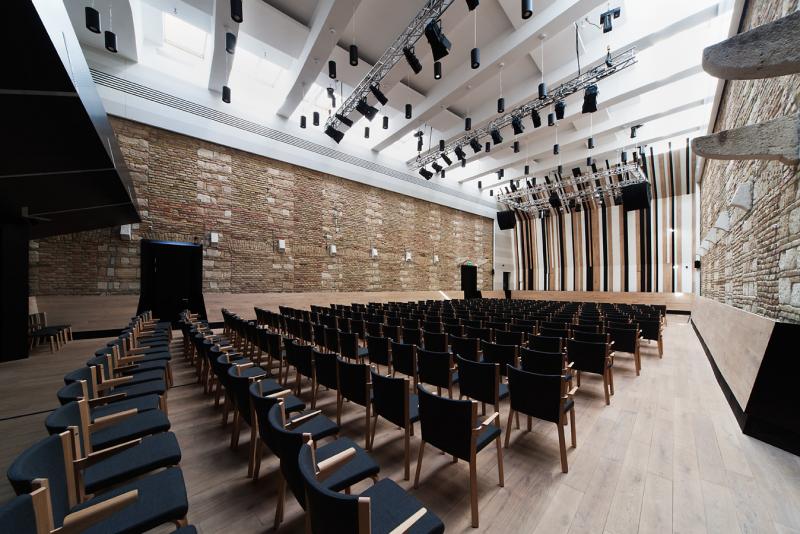
BMC. A home for music at the heart of Budapest
And a home László found. In 2006 BMC acquired the property on which the center's headquarters stands today. The building that originally stood on the property, situated in the ninth district of Budapest, was to be demolished, allowing László to negotiate a reasonable price with the city. At the time, the ninth district had a reputation for being a bit rougher and wasn't among the more prestigious parts of town—a circumstance which helped László make his case, against all odds and votes against within the municipality. In 2008 the BMC had all necessary permissions as well as been able to ensure a loan from the bank when the financial crisis happened and disrupted the financing of the building and ergo delayed its completion. Construction was picked up again in 2011, leading to the center finally being completed and in full use by 2013. The plans of the building itself were drawn up by Laszlo himself together with his architect daughter Dorottya Göz and divide up the building as follows: at the lower level of the center the Opus Jazz Club is situated. Like the entire center its doors opened for the first time in 2013. With a strong focus on the local and Hungarian Jazz scene and an intimate size fitting around 140 people, Opus Jazz Club is among the more unique music venues in Budapest. The ground level of the building comprises a concert hall fitting around 300 people, used for different types of events and concerts. The first floor is divided into one half library/information center and one-half recording studios while the attic provides guest rooms for the artists, making recording events or concerts efficient and comfortable for all parties involved. "Having everything under one roof makes everything more efficient, especially logistically speaking. But it's also so much more comfortable for the artists. There's no need for expensive hotel rooms, no travel time to and from the studio or concert hall, no need to go out to look for something to eat. When an artist comes to record or play at the BMC, he or she is taken care of and can focus solely on making music. It's a very inspiring atmosphere."
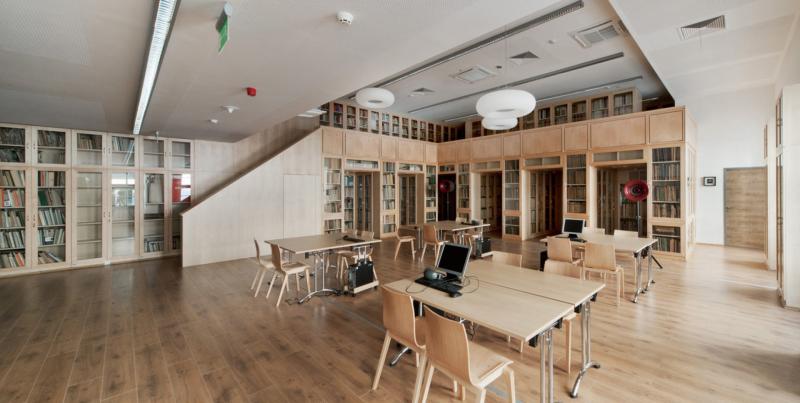
BMC Records
With a catalogue of over 250 releases to date—spanning from recordings featuring jazz heavyweights such as Chris Potter or Jack DeJohnette to younger and lesser known European talents—the record label part of the Budapest Music Center, BMC Records, carries the main representative function of the center's profile internationally. What started out as the odd release of just about any kind of music, unbound to any genre, has since developed into one of the most conceptualized label identities that exists today. Similar to the revered ECM label, BMC Records focuses around both, contemporary improvised music and classical music. In additional consistency to ECM's label philosophy, BMC's releases are visually conceptualized, too, bound together by ornate packaging and cover art designed by one sole artist, who's flamboyant experiments with contrast-rich shapes and strong colors give BMC's catalogue a distinctive mark. While a focus around Hungarian musicians still remains prominent, it used to be the label's main mission: "At the very beginning we focused only on Hungarian artists, especially in releases concerning jazz. On the classical side of things, we focused on Hungarian compositions, however the performing orchestras weren't always strictly Hungarian. But yes, for a long time, until 2004 or even 2005, it was our goal to somehow have a Hungarian connection in all of our releases in the field of jazz. I remember very vividly how there was a lot of discussion when we released our very first completely internationally cast album, featuring Marc Ducret and Christophe Monniot [Monio Mania (2006)]. When we realized that there would be no Hungarian musicians on the album, we were worried for a second (laughs), but then we thought to ourselves 'Does anyone ever question Manfred Eicher why this or that ECM release doesn't feature any German musicians?' The label itself is after all a symbol of Germany for a lot of people. But of course, no one cares. Why should we be ashamed if we can make a great album with great musicians, no matter where they're from. It doesn't make our label any less Hungarian.""So the move towards a more international cast of musicians happened very organically during the course of time. As is always the case, most Hungarian musicians will play with other foreign artists, some would even move to another country and have a French quartet as was the case with the guitarist Gábor Gadó, for example. One of the first bigger international names who recorded with BMC Records was Archie Shepp. That happened quite spontaneously. He was playing in Budapest and we knew his agent in Hungary who was the initiator of the idea to record with him. That's how the album Hungarian Bebop by the Mihály Dresch quartet featuring Archie Shepp came about. Funny enough, making that date happen was actually one of my first jobs."
Today BMC Records releases all kinds of different jazz, mostly from European musicians. The focus on European musicians is closely intertwined with the BMC's Opus Jazz Club: "The more detailed ideas for the Opus Jazz Club were born out of the Budapest Jazz Festival in the 2000s. The Festival had different venues, each with a different focus. We wanted one stage to be an exclusively European venue. The most interesting groups from Austria or France and so on came and played there, people who almost no one knew before. We wanted to push this European theme and so when we started Opus Jazz Club in 2013, we followed that same idea and decided to design the programming of the club according to a European theme. There's already a mainstream jazz club in Budapest [Budapest Jazz Club] where the big names from the States come and play. We didn't want to be redundant and copy that. Our strengths lie in knowing the European jazz scene quite well which is why our label and jazz club focus exactly on that." Besides providing a platform for local and national acts, the Opus Jazz Club has seen many renowned international faces perform on its intimate stage over the years, too. From British saxophonist Andy Sheppard or French clarinet legend Louis Sclavis to leading American tenors Chris Potter and Dave Liebman among many other international heavy-weights, Opus' stage always promises a rewarding experience.
Some smaller releases on BMC Records unfortunately fall under the radar, others are reviewed prominently and received with great critical acclaim. Among the more renowned musicians on the label are German saxophonist Daniel Erdmann and Japanese-native, Berlin-based pianist Aki Takase. Their collaborative effort from 2019 under the "Japanica" moniker, Thema Prima, notably received a five-star review from the Guardian's jazz critic John Fordham, who reveres the "Catchy hooks, freefall improv, raw noise and cryptic vocals" which amount to the "wilfully intoxicating jazz brew that only Takase could have stirred in quite this way." Wallner emphasizes the importance of partnerships with artists like Erdmann: "It's important to find out who to work with. Daniel Erdmann is among those very important partners of ours. His trio, Daniel Erdmann's Velvet Revolution is a really special project, an unusual trio that works wonders. And it's easy to work with him. For that project he came here to record, he was able to do everything under our rough and combine the recording session with a series of concerts, of course performed at the Opus."
When it comes down to the key factor defining the music on BMC records, Wallner refers to a sense of authenticity: "The most important thing for us at BMC records is that the music be authentic. Music that is real and makes you believe the artist's intentions are pure. It doesn't necessarily have to rewrite the rules. Take Density of Standards by the Béla Szakcsi Quartet featuring Christophe Monniot for example. A release that is built around the fact that the music on it is completely unoriginal. It features the most common jazz standards around. But it's how they do it, the conviction with which they play and the pureness that they convey that makes the recording so special."
From putting Hungarian pianist Áron Tálas' trio on the radar (Little Beggar, 2018) through releasing experimental contemporary improvised music like the trio Deep Ford's You May Cross here or Daniel Erdmann's Velvet Revolution to recording new interpretations of Johann Sebastian Bach's Well tempered clavier with Borbála Dobozy on harpsichord, there's no questioning the authenticity or pureness of the label's output. Nor the quality. In an effort to create a coherent and more or less complete picture of the label's output with only a handful of selected recordings, György Wallner provided the following list of releases, spanning from straight-ahead jazz to contemporary classical music, and added personal comments explaining why the respective record is so special. Naturally, not every facet of the label's music can be covered in this way—not even close—but the essential albums on this list may serve as a guide to dig even deeper into a catalogue filled to the brim with treasures from a vibrant Hungarian and European label.
BMC Records starter pack
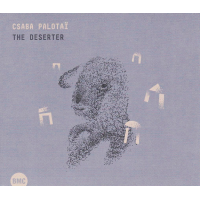 Csaba Palotaï
Csaba Palotaï The Deserter
BMC
2016
"Our first contact with Hungarian guitarist Csaba Palotaï, living in Paris, occurred back in 2002 when he approached us with rough but quite promising material from his "Grupa Palotaï," a quite special quintet comprised of a guitar, two saxophones, a sousaphone and drums. (One of the sax players was the young Thomas de Porquery). Their debut was published on our label in 2002, followed by two other ones in 2004 and 2007. After the group's breakup we remained in contact with Csaba, who regularly sent us info about his actual projects. Then after a long time, in the summer of 2015, Csaba sent some files with his solo recordings, with the remark, that he was sure we wouldn't be interested in releasing something like that, but he just wanted to keep is in the loop. I'll never forget the moment when we started listening to those tracks with our label manager Tamás Bognár and were struck immediately by these short songs of stripped-down, lean and haunting sounds of a guitar, with dreamlike musical fragments of most different genres, melting to an absolutely original and compact musical experience. We listened to them 3 or 4 times, then went over to our boss, László, with a CD to which we copied the songs and told him "just listen to this." After half an hour he returned to our office and said -"yes, this has got it." Ever since, this is the most often listened BMC Records album of Tamás..."
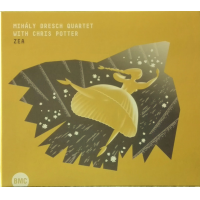 Mihály Dresch Quartet with Chris Potter
Mihály Dresch Quartet with Chris PotterZea
BMC
2016
"With Mihály Dresch and his quartet, the renowned representatives of Hungarian ethno-jazz, we had quite a nice series of albums since the beginning of the 2000s,' including their 2002 "Hungarian Bebop," where Archie Shepp joined them, to play Dresch's music. Due to his personal acquaintance with Chris Potter via his Hungarian wife, former organizer of the renowned annual Mediawave Festival, Dresch played quite often just privately with Chris, later continuing this in small clubs when Chris was in Hungary with the family. The album is a recording of a 2012 concert performed at the leading Hungarian venue MÜPA -at this time Opus was just still in the building phase, without knowing exactly, when it could be opened. That's the reason why we made the deal with MÜPA, to release their recording on our label. Later they performed at the club quite many times, so theoretically we could make an album of the vast recorded material from their Opus concerts as well, but then the deal with MÜPA was done already. The editing and mixing took quite a lot of time, that's why it wasn't released before 2016."
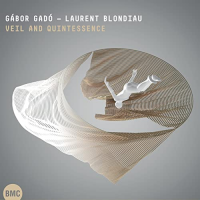 Gábor Gadó, Laurent Blondiau
Gábor Gadó, Laurent Blondiau Veil and Quintessence
BMC
2017
Guitarist Gábor Gadó was one of the first Hungarian jazz musicians with European potential whose music appeared on the BMC Records label in 1999. He used to work with Hungarian and European (mostly French and Belgian) musicians from the beginning and he appears on more than 20 albums of the label as leader of his various groups with different lineups, as a composer, arranger or as a sideman. Similar to the case with Csaba Palotaï, after some break he returned to us with the material of this marvellous, ethereal and highly spiritual album. It is a bit like all his former sophisticated arrangements would be distilled to the crystal-clear voices of only two instruments—the guitar and the trumpet.
 Matyas Szandai, Mathias Lévy, Miklós Lukács
Matyas Szandai, Mathias Lévy, Miklós LukácsBartók Impressions
BMC
2018
"Double-bassist Mátyás Szandai and the master of cimbalom, Miklós Lukács are also to be found on numerous other albums of the label, as members of the Dresch Quartet and of other Hungarian groups or as leaders of their own different outfits. This project was initiated by Mátyás Szandai, living in Paris since a while and thus playing often with Mathias Lévy as well, after the composer's rights on Bartók's works expired and finally it became possible for musicians worldwide to give a free flow to their inspirations by this giant composer of the 20th century. The simple lineup of violin, cimbalom and double bass could've easily been among the village groups playing to Bartók, when he was collecting folk music. These interpretations are virtuoso and the music, based on the the folk motifs of the composer, is beyond genres and imagination."
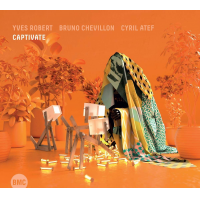 Yves Robert, BrunoChevillon, Cyril Atef
Yves Robert, BrunoChevillon, Cyril AtefCaptivate
BMC
2019
"A nice example, how the programming of Opus Jazz Club influences the AR of the label (and vice versa). Back in 2014, based on their former work released on ECM, we invited this magic trio to play a concert at the Opus. Actually, at that time they were not really active as a unit, but reacted very positively on our invitation and seemed very inspired. They played an unforgettable concert—which, without any former plans to make it, developed into an album, edited out of the concert's multitrack recording, with the title "Inspired." Their second album on the label, "Captivate," was planned and prepared carefully. It was recorded in our studio during a week of the trio's residence at BMC, closing the recording sessions with a tremendous concert."
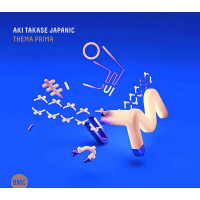 Aki Takase Japanic
Aki Takase JapanicThema Prima
BMC
2019
"Our acquaintance with Aki Takase dates back before Opus was opened. She used to perform at one of the Budapest Jazz Festivals, organized by us. She also performed at the Opus twice, and at her second concert, playing solo then, she was so enchanted by the circumstances and atmosphere of the building that she proposed to make her next album—with saxophonist Daniel Erdmann, her stepson DJ Illvibe plus rhythm section—at the BMC. We were more than happy about the idea, especially that beside our admiration of Aki, we had at that time already an album with Daniel Erdmann's Velvet Revolution and we loved working with him. Thema Prima is the result of the team's one-week residency at BMC, full of fun. Just check out the result and you'll hear it!"
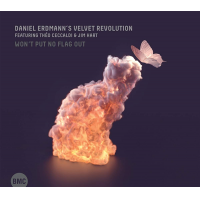 Daniel Erdmann's Velvet Revolution
Daniel Erdmann's Velvet RevolutionWon't put no Flag out
BMC
2019
"Daniel Erdmann is one of our favorite musicians, he used to play at the Opus with different groups like Das Kapital, Ten Songs of Utopia with Samuel Rohrer, Frank Möbus and Vincent Courtois as well as in trio with Courtois and Robin Fincker. After playing a couple of times here, and getting acquainted with our label's profile, Daniel approached us in 2015 with his idea of forming a new group with violinist Théo Ceccaldi and vibraphonist Jim Hart. He had attached some simple demo recordings to his mail. When listening to them, a similar thing happened as with the demos of Csaba Palotai's solo work. We were totally fascinated by them, thus, very spontaneously, we agreed on organizing a recording session in May 2016. The resulting debut of the trio, entitled a Short Moment of Zero G was awarded the German Echo-prize in the category of Daniel as the German saxophonist of the year, and received the prestigious "Preis der Deutschen Schallplattenkritik," not to mention the dozens of positive reviews worldwide. Right after the release of the debut we already started to plan the follow-up album, which came out in 2019. If the debut was superb, then I don't even know what to say about the sophomore album? One of my most beloved from our catalogue. Real world class."
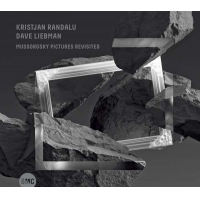 Kristjan Randalu, Dave Liebman
Kristjan Randalu, Dave LiebmanMussorgsky Pictures Revisited
BMC
2020
"Both Dave and Kristjan had played separately at Opus, not to mention that we had made albums and organized concerts with Dave already back in the 2000s. However, we didn't know anything about Kristjan's unique project with Dave, performing the Mussorgsky classic in his amazing arrangement for piano and soprano sax at some classical venues in Estonia, until Dave sent us an mp3 file with the recording of the sold-out concert in Tallinn. It is quite a risky thing to re-work or adapt such a hit as the Pictures, so we were a bit suspicious before starting to listen. After the very first couple of seconds of listening to the concert recording though, we were convinced by the incredible tastefulness, with which Kristjan handled the original material and impressed by his one and only choice as a collaborator, Dave on sax. It took some time to arrange a concert of the duo in our concert hall and record the music the next day in the same hall—we only had that one day for the recording. It was an enormous task, but at the end of the day we could finish the complete recording and the rough editing. Dave left early next morning, Kristjan stayed one more day, for fine adjustments in the editing. The album highlights not only the work of the two musicians but also that of our excellent sound engineer, Viktor Szabó."
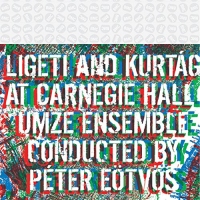 UMZE Ensemble conducted by Péter Eötvös
UMZE Ensemble conducted by Péter EötvösLigeti & Kurtág at Carnegie Hall
BMC
2010
"This album sort of presents the essence of what Budapest Music Center, including the record label, is all about when it comes to contemporary classical music. We'd put in a lot of work to make this concert happen at the Carnegie Hall in January 2009, as part of the series "Extremely Hungary," organized in NYC. It presents significant works by two of the greatest 20-21st century Hungarian composers, György Ligeti and György Kurtág, performed by UMZE, an outstanding artist's ensemble for contemporary music, conducted by Péter Eötvös—another master of our time, both as composer and as a conductor—and featuring world-class soloists."
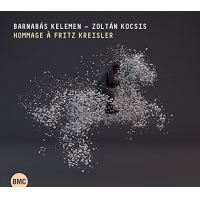 Barnabás Kelemen, Zoltán Kocsis
Barnabás Kelemen, Zoltán KocsisHommage à Fritz Kreisler
BMC
2017
"On this very last recording of him, pianist-conductor Zoltán Kocsis selected twenty-one masterpieces with music of thirteen nations and peoples, from the legendary violinist Fritz Kreisler's marvelous body of work, to perform them with his long-time chamber music partner, Barnabás Kelemen. The album unveils so far unknown beauty and depth of these well-known pieces, often regarded as sort of "light" classical music."
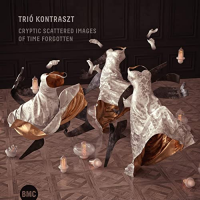 Trió Kontraszt
Trió KontrasztCryptic Scattered Images of Time Forgotten
BMC
2020
" The the third album by the Trió Kontraszt is a musical memorial of pianist and band leader Stevan Kovacs Tickmayer. Like Sinbad, he roams through time, browsing through the chapters of his life with the expansive calm of bygone times, from his years in Novi Sad, through the time at the Budapest free music school, to his studies in the Netherlands, and this way free and contemporary music, dance music, and the jazz idiom all find a place next to one another. He is accompanied by credible witnesses: saxophonist István Grencsó has long been a fellow-musician, and Szilveszter Miklós, having been born in Vojvodina and embedded in the free music school, speaks the same musical language as Tickmayer: the language of musical multilingualism"
Tags
Interview
Friedrich Kunzmann
László Gőz
Steve Reich
Philip Glass
Locomotiv GT
Laszlo Decz
Peter Eötvös
Larry Coryell
Candy Dulfer
Chris Potter
Jack DeJohnette
Marc Ducret
Christophe Monniot
Manfred Eicher
Gabor Gado
archie shepp
Mihaly Dresch
Daniel Erdemann
Aki Takase
Daniel Erdmann
Béla Szakcsi
Áron Tálas
Borbala Dobozy
PREVIOUS / NEXT
Support All About Jazz
 All About Jazz has been a pillar of jazz since 1995, championing it as an art form and, more importantly, supporting the musicians who make it. Our enduring commitment has made "AAJ" one of the most culturally important websites of its kind, read by hundreds of thousands of fans, musicians and industry figures every month.
All About Jazz has been a pillar of jazz since 1995, championing it as an art form and, more importantly, supporting the musicians who make it. Our enduring commitment has made "AAJ" one of the most culturally important websites of its kind, read by hundreds of thousands of fans, musicians and industry figures every month.






















